module7 Unit 1单元测试题1
- 格式:doc
- 大小:378.50 KB
- 文档页数:23
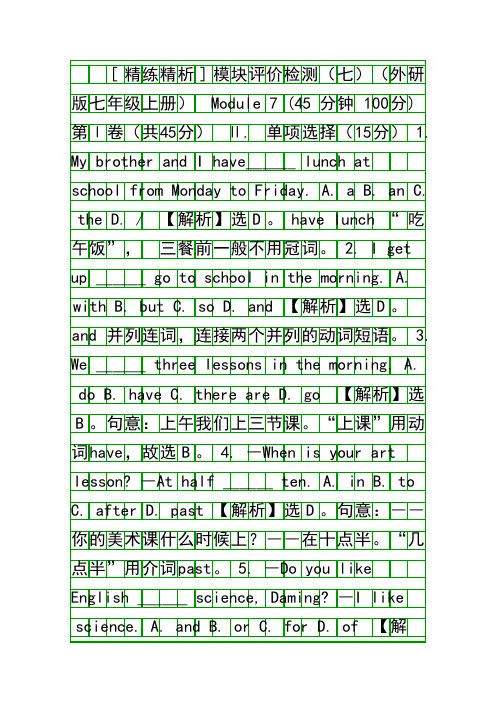
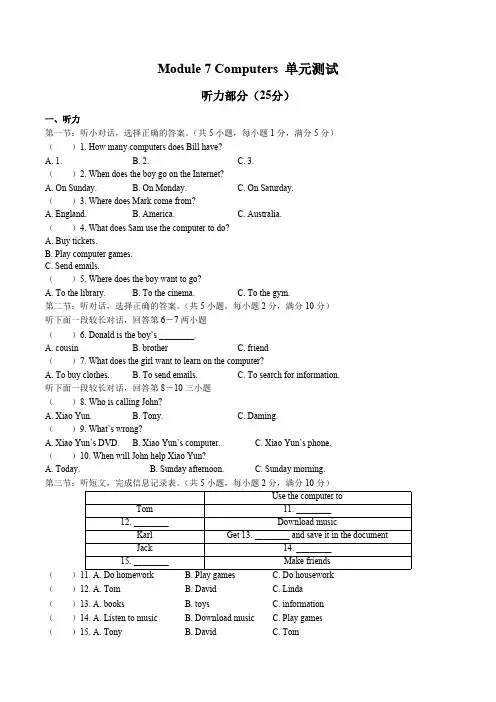
Module 7 Computers 单元测试听力部分(25分)一、听力第一节:听小对话,选择正确的答案。
(共5小题,每小题1分,满分5分)()1. How many computers does Bill have?A. 1.B. 2.C. 3.()2. When does the boy go on the Internet?A. On Sunday.B. On Monday.C. On Saturday.()3. Where does Mark come from?A. England.B. America.C. Australia.()4. What does Sam use the computer to do?A. Buy tickets.B. Play computer games.C. Send emails.()5. Where does the boy want to go?A. To the library.B. To the cinema.C. To the gym.第二节:听对话,选择正确的答案。
(共5小题,每小题2分,满分10分)听下面一段较长对话,回答第6-7两小题()6. Donald is the boy’s ________.A. cousinB. brotherC. friend()7. What does the girl want to learn on the computer?A. To buy clothes.B. To send emails.C. To search for information.听下面一段较长对话,回答第8-10三小题()8. Who is calling John?A. Xiao Yun.B. Tony.C. Daming.()9. What’s wrong?A. Xiao Yun’s DVD.B. Xiao Yun’s computer.C. Xiao Yun’s phone.()10. When will John help Xiao Yun?A. Today.B. Sunday afternoon.C. Sunday morning.第三节:听短文,完成信息记录表。
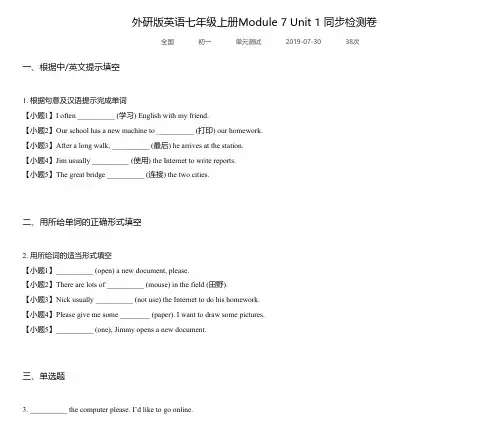
外研版英语七年级上册Module 7 Unit 1 同步检测卷全国初一单元测试2019-07-3038次一、根据中/英文提示填空1. 根据句意及汉语提示完成单词【小题1】I often __________ (学习) English with my friend.【小题2】Our school has a new machine to __________ (打印) our homework.【小题3】After a long walk, __________ (最后) he arrives at the station.【小题4】Jim usually __________ (使用) the Internet to write reports.【小题5】The great bridge __________ (连接) the two cities.二、用所给单词的正确形式填空2. 用所给词的适当形式填空【小题1】__________ (open) a new document, please.【小题2】There are lots of __________ (mouse) in the field (田野).【小题3】Nick usually __________ (not use) the Internet to do his homework.【小题4】Please give me some ________ (paper). I want to draw some pictures.【小题5】__________ (one), Jimmy opens a new document.三、单选题3. __________ the computer please. I’d like to go online.A.Turn on B.Turn offC.Turn up D.Turn down4. Lisa __________ like to go out and she likes to stay at home.A.doesn’t B.is not C.not D.don’t5. — __________ do you have your computer lesson?—In our computer lab.A.When B.Where C.What D.Who6. — __________ do I print my homework?—Click “print” and “OK”.A.What B.Where C.How D.When7. He lives on the __________ floor.A.one B.first C.once D.twice8. Bob,the radio is too noisy, please ______.A.turn it off B.turn off it C.turn it on D.turn on it9. Slow down. Let me __________ the document before closing the windows.A.to save B.saves C.save D.saving10. I can write my homework _________ the computer.A.on B.in C.at D.with11. Mike’s sister often goes to concerts and she usually buys CDs __________ her favourite singers.A.by B.from C.on D.in12. First, __________ the monitor to the computer.A.connect B.visit C.open D.click四、句型转换13. 句型转换【小题1】The tiger lives in Asia. (对画线部分提问)__________ __________ the tiger __________ ?【小题2】Do you like music? (作肯定回答)Yes, ________ ______.【小题3】She goes to school by bus. (对画线部分提问)_______ ________ she _________ to school?【小题4】It’s a green ruler. (改为同义句) The ruler __________ .【小题5】She is my friend. (改为否定句)She ______ ______ my friend.五、完成句子14. 根据汉语意思完成句子【小题1】你怎样使用电脑?_______ ______ you _______ the computer?【小题2】把显示器连接到电脑上。
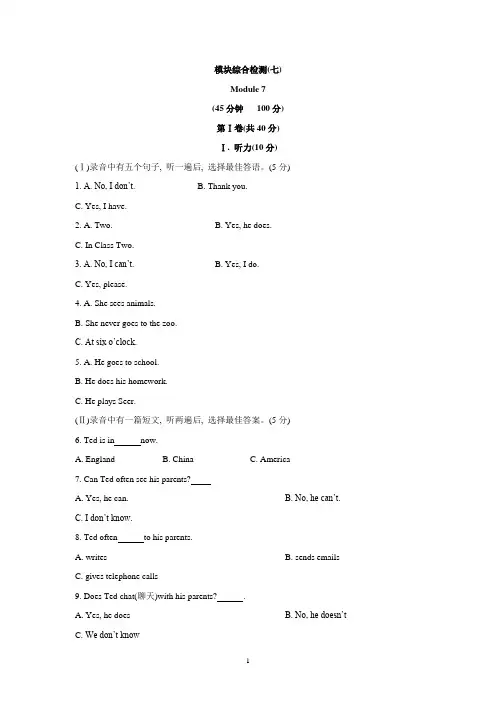
Module 7(45分钟100分)第Ⅰ卷(共40分)Ⅰ. 听力(10分)(Ⅰ)录音中有五个句子, 听一遍后, 选择最佳答语。
(5分)1. A. No, I don’t. B. Thank you.C. Yes, I have.2. A. Two. B. Yes, he does.C. In Class Two.3. A. No, I can’t. B. Yes, I do.C. Yes, please.4. A. She sees animals.B. She never goes to the zoo.C. At six o’clock.5. A. He goes to school.B. He does his homework.C. He plays Seer.(Ⅱ)录音中有一篇短文, 听两遍后, 选择最佳答案。
(5分)6. Ted is in now.A. EnglandB. ChinaC. America7. Can Ted often see his parents?A. Yes, he can.B. No, he can’t.C. I don’t know.8. Ted often to his parents.A. writesB. sends emailsC. gives telephone calls9. Does Ted chat(聊天)with his parents?.A. Yes, he doesB. No, he doesn’tC. We don’t knowA. basketballB. table tennisC. footballⅡ. 单项选择(10分)1. Lingling, have dinner and then do your homework.A. firstB. nextC. thenD. finally2. —Can you connect the mouse the computer?—Yes, I can.A. onB. inC. forD. to3. You can use the to click “save” to save the document.A. screenB. printerC. keyboardD. mouse4. (2012·西宁中考)—do you have a class meeting?—Once a week.A. How oldB. How farC. How oftenD. How long5. I want to use the computer. Can you?A. turn on itB. turn it onC. turn it offD. turn off it6. My father computer games at home.A. sometimes playB. plays sometimesC. sometime playsD. sometimes plays7. (2012·黔西南州中考)Sally works very hard. Finally, she won the first place. 可代替画线部分的是:A. At the end ofB. At lastC. LuckilyD. To the end8. Jill and Bill their homework in the afternoon.A. doesn’tB. doesn’t doC. don’tD. don’t do9. —Tony often online?A. Does; goB. Do; goC. Does; goesD. Do; goes10. We can use a computer to search some information on the Internet.A. ofB. atC. fromD. forⅢ. 完形填空(10分)Lin Tao has a computer. He likes1very much. He often2the Internet.He downloads(下载)music from the Internet. He often visits websites(网站)to get3for4homework. He also5emails to his good friends. He makes manygood friends from all6the world with the help of his computer. He likestravelling very much, so he often7travel plans on the computer. 8hedoesn’t download games9the Internet, because he10like computer games at all.1. A. him B. it C. its D. them2. A. makes B. visits C. checks D. uses3. A. information B. questions C. answers D. books4. A. his B. her C. he D. she5. A. sends B. send C. buy D. buys6. A. for B. over C. in D. on7. A. takes B. makes C. buys D. has8. A. And B. Or C. But D. So9. A. in B. from C. to D. at10. A. don’t B. can’t C. doesn’t D. isn’tⅣ. 阅读理解(10分)Jessica is a 25-year-old woman. She works in a company. She is a busywoman. Like many young people, the computer is the most(最) important part inJessica’s daily life. She spends a lot of time in front of a computer every day. Inthe morning, she reads news on the computer for one hour and then she works forthree hours. In the afternoon, she works on the computer for about four hours.When she goes home in the evening, she still sits in front of her computer. Sheplays games or talks with her friends on the Internet. Sometimes she buys things, such as books,1. How old is Jessica?A. She is twenty.B. She is twenty-two.C. She is twenty-four.D. She is twenty-five.2. Where does Jessica work?A. In a company.B. In a school.C. In a hotel.D. In a hospital.3. How long does Jessica work a day?A. About three hours.B. About four hours.C. About five hours.D. About seven hours.4. What does Jessica usually do on the computer in the evening?A. She reads news.B. She works.C. She listens to music.D. She plays games.5. Which of the following is TRUE?A. Jessica is not happy with her daily life.B. The computer is important for Jessica.C. Jessica enjoys working in her company.D. Jessica often uses the computer to print documents.第Ⅱ卷(共60分)Ⅴ. 用所给词的适当形式填空(10分)1. I want(send)emails to my friends.2. Henry(not visit)his grandparents on Sundays.3. Do you like(listen)to music?4. Danny(search)for some information for his homework.5. My uncle often(check)the timetable on the Internet.Ⅵ. 完成句子(10分)1. 你经常上网吗?you often______ ______ the Internet?2. 我在网上与朋友交谈, 但是我不玩游戏。
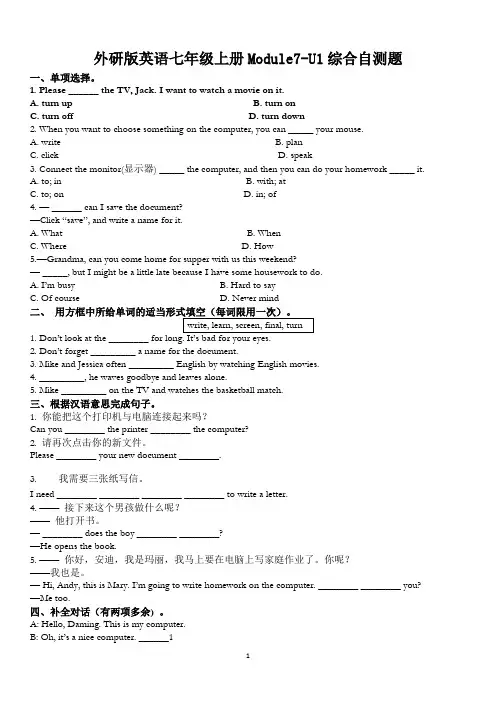
外研版英语七年级上册Module7-U1综合自测题一、单项选择。
1. Please ______ the TV, Jack. I want to watch a movie on it.A. turn upB. turn onC. turn offD. turn down2. When you want to choose something on the computer, you can _____ your mouse.A. writeB. planC. clickD. speak3. Connect the monitor(显示器) _____ the computer, and then you can do your homework _____ it.A. to; inB. with; atC. to; onD. in; of4. — ______ can I save the document?—Click “save”, and write a name for it.A. WhatB. WhenC. WhereD. How5.—Grandma, can you come home for supper with us this weekend?— _____, but I might be a little late because I have some housework to do.A. I’m busyB. Hard to sayC. Of courseD. Never mind二、2. Don’t forget _________ a name for the document.3. Mike and Jessica often _________ English by watching English movies.4. _________, he waves goodbye and leaves alone.5. Mike _________ on the TV and watches the basketball match.三、根据汉语意思完成句子。
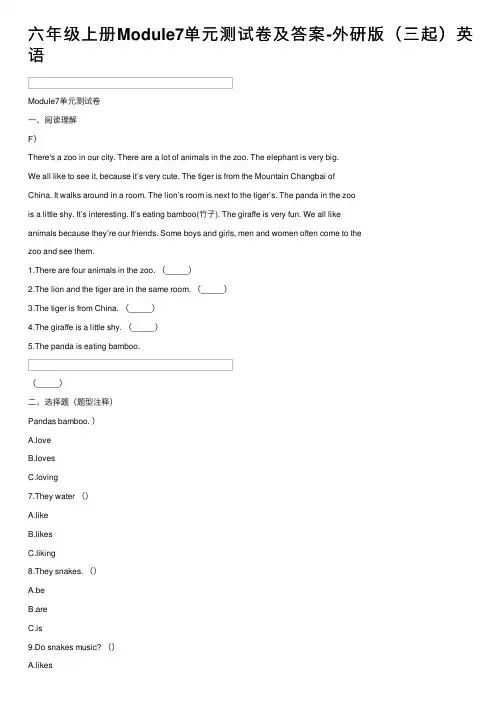
六年级上册Module7单元测试卷及答案-外研版(三起)英语Module7单元测试卷⼀、阅读理解F)There's a zoo in our city. There are a lot of animals in the zoo. The elephant is very big.We all like to see it, because it’s very cute. The tiger is from the Mountain Changbai ofChina. It walks around in a room. The lion’s room is next to the tiger’s. The panda in the zoois a little shy. It’s interesting. It’s eating bamboo(⽵⼦). The giraffe is very fun. We all likeanimals because they’re our friends. Some boys and girls, men and women often come to thezoo and see them.1.There are four animals in the zoo. (_____)2.The lion and the tiger are in the same room. (_____)3.The tiger is from China. (_____)4.The giraffe is a little shy. (_____)5.The panda is eating bamboo.(_____)⼆、选择题(题型注释)Pandas bamboo. )A.loveB.lovesC.loving7.They water ()A.likeB.likesC.liking8.They snakes. ()A.beB.areC.is9.Do snakes music? ()B.likeC.liking10.I believe it. ()A.amB.doesC.don't11.She writing. ()A.likeB.likingC.likes12.She wants an email. ()A.to writeB.writedC.wrote13.Can the dog meat? ()A.eatsB.eatC.eating14.The snake can use body to dance. ()A.theirB.itC.its15.Why does the snake come out the box? ()A.inB.with C.of三、连词成句16.snakes, do, like, music(?)________________________________________ 17.snakes, out, come, the, of, box, the(.)_________________________________________ 18.this, at, look, picture(.)_______________________________________________________________________________________20.like, pandas, bamboo, the(.)____________________________________________四、填空题21.like(现在分词)__________22.can't(完全形式)____________23.panda(复数)___________24.here(对应词)_____________25.he(宾格)_________根据句意选词填空。
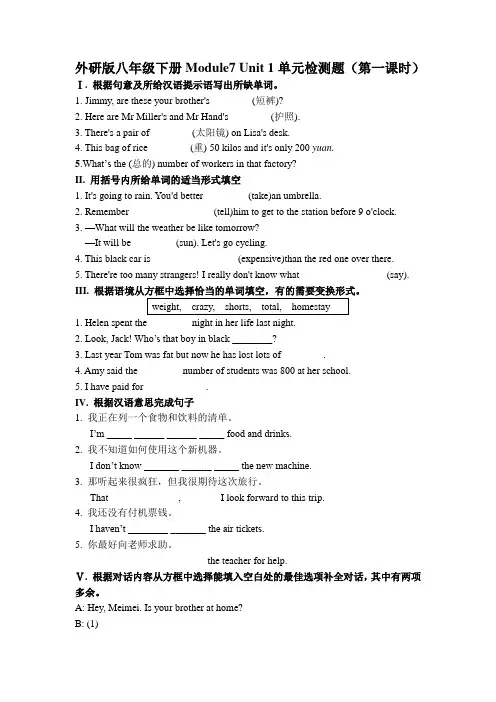
外研版八年级下册Module7 Unit 1单元检测题(第一课时)Ⅰ. 根据句意及所给汉语提示语写出所缺单词。
1. Jimmy, are these your brother's ________(短裤)?2. Here are Mr Miller's and Mr Hand's ________(护照).3. There's a pair of ________(太阳镜) on Lisa's desk.4. This bag of rice ________(重) 50 kilos and it's only 200 yuan.5.What’s the (总的) number of workers in that factory?II. 用括号内所给单词的适当形式填空1. It's going to rain. You'd better ________ (take)an umbrella.2. Remember________ ________ (tell)him to get to the station before 9 o'clock.3. —What will the weather be like tomorrow?—It will be ________ (sun). Let's go cycling.4. This black car is ________ ________ (expensive)than the red one over there.5. There're too many strangers! I really don't know what ________ ________ (say). III.1. Helen spent the ________ night in her life last night.2. Look, Jack! Who’s that boy in black ________?3. Last year Tom was fat but now he has lost lots of ________.4. Amy said the ________ number of students was 800 at her school.5. I have paid for __________ .IV. 根据汉语意思完成句子1. 我正在列一个食物和饮料的清单。
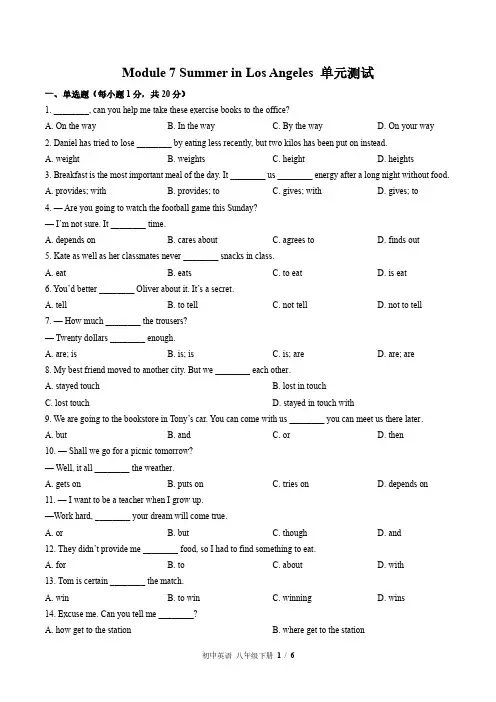
Module 7 Summer in Los Angeles 单元测试一、单选题(每小题1分,共20分)1. ________, can you help me take these exercise books to the office?A. On the wayB. In the wayC. By the wayD. On your way2. Daniel has tried to lose ________ by eating less recently, but two kilos has been put on instead.A. weightB. weightsC. heightD. heights3. Breakfast is the most important meal of the day. It ________ us ________ energy after a long night without food.A. provides; withB. provides; toC. gives; withD. gives; to4. — Are you going to watch the football game this Sunday?— I’m not sure. It ________ time.A. depends onB. cares aboutC. agrees toD. finds out5. Kate as well as her classmates never ________ snacks in class.A. eatB. eatsC. to eatD. is eat6. You’d better ________ Oliver about it. It’s a secret.A. tellB. to tellC. not tellD. not to tell7. — How much ________ the trousers?— Twenty dollars ________ enough.A. are; isB. is; isC. is; areD. are; are8. My best friend moved to another city. But we ________ each other.A. stayed touchB. lost in touchC. lost touchD. stayed in touch with9. We are going to the bookstore in Tony’s car. You can come with us ________ you can meet us there later.A. butB. andC. orD. then10. — Shall we go for a picnic tomorrow?— Well, it all ________ the weather.A. gets onB. puts onC. tries onD. depends on11. — I want to be a teacher when I grow up.—Work hard, ________ your dream will come true.A. orB. butC. thoughD. and12. They didn’t provide me ________ food, so I had to find something to eat.A. forB. toC. aboutD. with13. Tom is certain ________ the match.A. winB. to winC. winningD. wins14. Excuse me. Can you tell me ________?A. how get to the stationB. where get to the stationC. how to get to the stationD. where to get to the station15. —________ does it take to get to Beijing?—Nine hours.A. How oftenB. How soonC. How muchD. How long16. Learning English well depends ________ yourself.A. aboutB. ofC. onD. for17. —What else do you want?—________ else. I think I’ve got everything ready.A. EverythingB. SomethingC. NothingD. Anything18. —Please ________ the form.—OK.A. pay forB. check inC. pick upD. fill out19. You’d better ________ your sweater. It’s cold outside.A. wearB. to wearC. put onD. to put on20. The little boy ________ his seat to an old lady on the crowded bus.A. lentB. offeredC. tookD. brought二、完型填空(每小题1分,共10分)Many people go to school for an education. They 21 languages and other subjects. Others go to 22 to learn a skill so that they can make a living. 23 no one can learn everything from school. A teacher, no matter 24 he knows, cannot teach his students everything they 25 to know. So, much more is to be learned 26 school by the students themselves. It is always 27 to know how to study by oneself than to memorize some formulas(公式). Formulas are easy to remember but difficult to use in 28 out maths problems. As we all know, great 29 , such as Einstein, Newton and Galileo, didn’t learn many things from school. But they were all so successful that they 30 so many things for us.21. A. speak B. learn C. make D. dislike22. A. school B. home C. cinema D. park23. A. If B. But C. Or D. Though24. A. how many B. how soon C. how much D. how often25. A. stop B. forget C. fail D. want26. A. outside B. in C. within D. from27. A. important B. most important C. unimportant D. more important28. A. getting B. working C. taking D. doing29. A. scientists B. doctors C. students D. workers30. A. celebrated B. invented C. shared D. remembered三、阅读理解(每小题2分,共20分)(A)31. The ads are both about ________.A. problemsB. vacation tripsC. language learningD. trip plans32. The summer courses will offer ________ classroom language learning.A. 5 days’B. 4 days’C. 6 days’D. 3 days’33. If a person goes to the evening classes, he can ________.A. have short toursB. practise his grammar moreC. stay with an English familyD. sell something in class34. From the second ad, we can infer that the classes are for ________.A. native English speakersB. non-native English speakersC. the Chinese kidsD. the English kids35. The two ads both tell us ________.A. when the courses will startB. where the courses areC. what the students can doD. how much the courses are(B)We spent a few days in Paris last week. We visited the famous city quite regularly. After all, it only takes three hours from London to Paris. It’s always a pleasure visiting places we really like and exploring areas we’ve never been.The only unlucky thing this time was the weather. As soon as we got there the temperature reached almost 35degrees (which lasted until we left). It was so hot that Matthew just couldn’t stand it—for him, it wasn’t the most enjoyable trip. I felt sorry for him because every time we go there he has to put up with(忍受) my endless shopping spree (狂欢)…Because of the heat, we ended up just having lots of ice cream and drinks most of the time, although we managed to pay a few visits to the new Herme shop on Rue de Vaugirard at least. It’s not as busy as the shop on Rue Bonaparte so you can choose whatever you like without worrying about a queue behind you! I really enjoyed his bread this time as well as the cakes. And I must say that his Croissant aux Amandes and Bostock were simply the best I’ve ever had.36. Which of the following is TRUE according to the first paragraph?A. The writer stayed in Paris for a month last year.B. It was a long way from London to Paris.C. The writer enjoyed herself during the trip.D. The writer only likes to go to places she has never been to.37. The underlined word “stand” in the second paragraph means ________.A.享受B.忍受C.站立D.位于38. What can you know about Matthew from the second paragraph?A. He doesn’t like shopping.B. He doesn’t like travelling.C. He is one of the writer’s relatives.D. He isn’t a good husband.39. The shops on Rue Bonaparte ________.A. have no bread that the writer likesB. are often crowded with customersC. don’t have anything the writer likesD. are not very busy all the time40. What’s the best title for the passage?A. An unpleasant tripB. A great cityC. A shopping centreD. A trip to Paris四、用所给单词的正确形式填空(每小题1分,共10分)41. Before you go shopping, you’d better make a l________.42. The w________ of little Bob was four kilos when he was born.43. Children shouldn’t d________ on their parents all the time.44. Daming studies very hard, so he has made great p________.45. He likes to wear s________ in summer because of the hot weather. It’s good for his eyes.46. It’s very cold today. You’d better ________(not take) off your coat.47. Tom as well as his family ________(fly) a kite in the playground now.48. — Do you know how ________(get) good grades?— Of course. You must work hard at every subject.49. It’s a great way ________(make)friends with foreigners.50. I will return the book if I ________(finish)reading it.五、根据汉语意思完成句子,每空一词(每小题1分,共5分)51.你如何与你的朋友保持联系?How do you ________ ________ ________ ________ your friends?52.我喜欢红色胜过绿色。
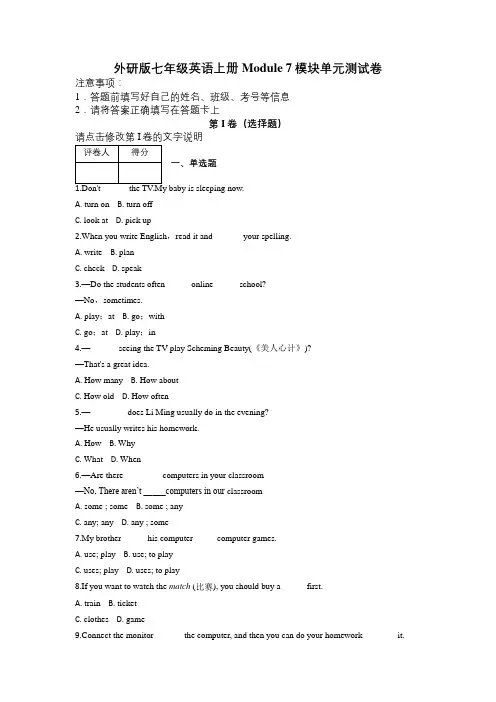
外研版七年级英语上册Module 7模块单元测试卷注意事项:1.答题前填写好自己的姓名、班级、考号等信息2.请将答案正确填写在答题卡上第I卷(选择题)一、单选题A. turn onB. turn offC. look atD. pick up2.When you write English,read it and ______ your spelling.A. writeB. planC. checkD. speak3.—Do the students often______online______school?—No,sometimes.A. play;atB. go;withC. go;atD. play;in4.—______ seeing the TV play Scheming Beauty(《美人心计》)?—That's a great idea.A. How manyB. How aboutC. How oldD. How often5.—________ does Li Ming usually do in the evening?—He usually writes his homework.A. HowB. WhyC. WhatD. When6.—Are there ________ computers in your classroom—No, There aren’t _____computers in our classroomA. some ; someB. some ; anyC. any; anyD. any ; some7.My brother _____ his computer _____computer games.A. use; playB. use; to playC. uses; playD. uses; to play8.If you want to watch the match (比赛), you should buy a _____ first.A. trainB. ticketC. clothesD. game9.Connect the monitor ______ the computer, and then you can do your homework ______ it.A. to ; inB. with ; atC. to ; onD. in ; of10.—______ do I save the document?—You click “save”, and write a name for it.A. WhatB. WhenC. WhereD. Howually, Sally has noodles for breakfast. ________she has hamburgers.A. SometimesB. SometimeC. Some timesD. Some time12.—________________—My friends.A. When do you use a computer?B. Who do you write emails to?C. Where do you write emails?D. What do you do on the Internet?13.Jill and Bill______their homework in the afternoon.A. doesn’tB. doesn’t doC. don’tD. don’t do14.I love ice-cream, ______I can’t eat too much, because I don’t want to be fat.A. andB. butC. orD. so15.—Daddy, can you come home for supper with us this weekend?— ______ , but I might be a little late.A. I’m busyB. Hard to sayC. Of courseD. Never mind二、阅读理解网上冲浪).Most of them go to the Internet bar and spend more than two hours there. They can do their homework,get some information for their study,download music,and send emails on the computer. But some of them spend too much time playing computer games,and it is bad for their study.16.Which of the following is popular with students today?A. The television.B. The radio.C. The recorder.D. The computer.17.Where do most students surf the Internet?A. At home.B. At school.C. At the Internet bar.D. In the library.18.How many hours do most of the students spend on the computers?A. Two hours.B. More than two hours.C. One hour.D. Less than two hours.19.What can the students do on the computer?A. They can download music.B. They can send emails.C. They can do their homework.D. All of the above20.Spending too much time ______ on the computer is bad for their study.A. playing gamesB. getting information for the students' studyC. doing their homeworkD. practising EnglishComputers are very important in our life. People can search for information, send emails and do many other things. Many people shop on the Internet, because they have no time to go shopping. But there are still many people shopping in the stores. We have got some numbers in a survey (调查). Let’s have a look!45% people like shopping on the Internet and 55% people like shopping in the stores.64% people learn about things on the Internet before buying them in the stores.71% women buy things on the Internet, but only 52% men do this.Why do many people shop in the stores? Some people don’t want to wait for (等候) their things to arrive (到达). And some want to see the real (真的) things before buying them. What do you think of it?21.Many people like shopping on the Internet because they’re ______.A. funnyB. tiredC. busyD. different22.If there are 100 people, ______ of them like shopping on the Internet.A. 45B. 44C. 52D. 7123.The survey says ______ can help people learn about things before buying.A. watching TVB. going on the InternetC. reading a bookD. writing emails24.______ women shop in the stores.A. 64%B. 71%C. 48%D. 29%25.We can see the passage (文章) in a ______.A. dictionaryB. Chinese bookC. newspaperD. science book26.Lisa often uses her computer to _____.A. do her workB. play gamesC. watch moviesD. do some shopping27._____ often plays computer games.A. DanielB. Daniel’s brotherC. Daniel’s sisterD. Daniel’s father28.Jenny talks with her friends on the computer _____.A. every Sunday nightB. every Thursday nightC. every Saturday nightD. every Friday night29.Thomas uses the computer _____.A. at homeB. at his friend’s homeC. at the schoolD. at the school library30.Which of the following is TRUE?A. Lisa is a maths teacher.B. Jenny is the manager of a shop.C. Thomas uses the computer to shop.D. Daniel thinks using the computer too often is bad for his eyes.三、完型填空?Let me ______ you.First,you must ______ the right number.If(如果) you're not sure about the ______,you can check it.Second,you should ______ the person some time to answer the phone.Please ______ patient(耐心的)and wait for a few more minutes.Third,you must speak clearly.Don't shout(喊)______ mutter(嘀咕).And your mouth should be one inch(英寸)away ______ the phone.Fourth,after ______“hello”,you should tell the person your name and who you are.Fifth,if the person isn't ______,you should let the person who is answering the phone take a message for you.______,please put the telephone gently(轻放电话).It's not polite to throw the phone.31.A. say B. tell C. talk D. speak32.A. write B. read C. know D. see33.A. website B. person C. number D. email34.A. give B. use C. take D. spend35.A. am B. is C. are D. be36.A. so B. or C. but D. then37.A. to B. from C. near D. beside38.A. saying B. telling C. speaking D. asking39.A. at B. to C. from D. in40.A. Finally B. Firstly C. Usually D. Last第II卷(非选择题)四、单词拼写41.—What is your travel p______for the summer vacation?—I’m going to Beijing to visit the Great Wall.42.I want to book a t__________to Shanghai on the computer.43.At weekends there are lots of__________(顾客)in the supermarket.44.My uncle works in a big__________(公司).45.Where do you want to go for your winter__________(假期)?五、句型转换46.They have some new computers. (改为一般疑问句)__________they have__________new computers?47.I click on “new document” on the left of the screen. (对画线部分提问)2__________________you click on “new document”?48.I write ten emails every Sunday. (对画线部分提问)____________________emails do you write every Sunday?49.There is no computer in my home.(同义句转换)There ___________________computer in my home.50. My father checks his email every day. (对画线部分提问)__________________ his email every day?六、书面表达请你写一篇题为“My computer”的短文,向大家介绍一下自己经常在电脑上做的事情。
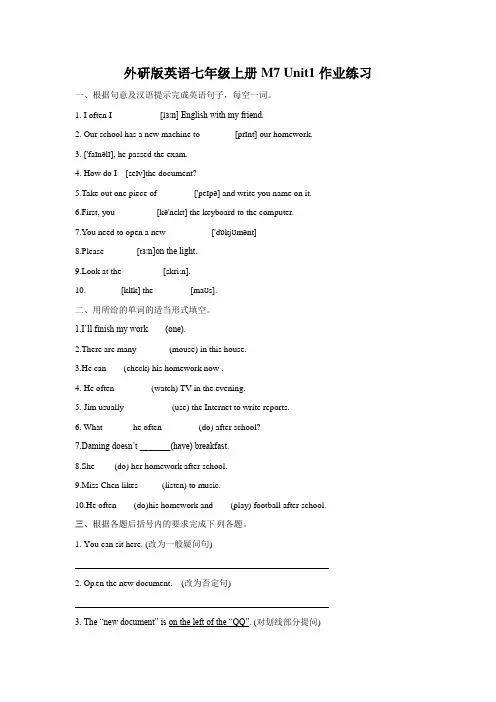
外研版英语七年级上册M7 Unit1作业练习一、根据句意及汉语提示完成英语句子,每空一词。
1. I often I __________ [lɜːn] English with my friend.2. Our school has a new machine to _______ [prɪnt] our homework.3. ['faɪnəlɪ], he passed the exam.4. How do I [seɪv]the document?5.Take out one piece of ________['peɪpə] and write you name on it.6.First, you _________[kə'nekt] the keyboard to the computer.7.You need to open a new __________['dɒkjʊmənt]8.Please _______[tɜːn]on the light.9.Look at the _________[skri:n].10.________[klɪk] the ________[maʊs].二、用所给的单词的适当形式填空。
1.I’ll finish my work (one).2.There are many _______(mouse) in this house.3.He can (check) his homework now .4. He often ________(watch) TV in the evening.5. Jim usually __________ (use) the Internet to write reports.6. What ______ he often ________(do) after school?7.Daming doesn’t _______(have) breakfast.8.She ____(do) her homework after school.9.Miss Chen likes _____(listen) to music.10.He often____(do)his homework and____(play) football after school.三、根据各题后括号内的要求完成下列各题。
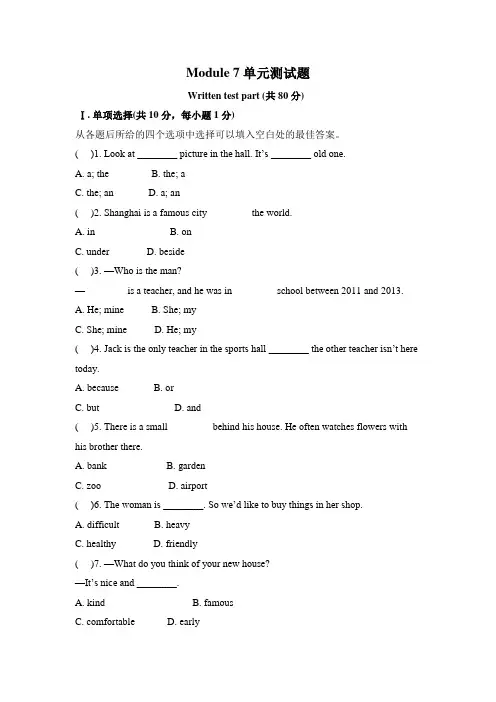
Module 7单元测试题Written test part (共80分)Ⅰ. 单项选择(共10分,每小题1分)从各题后所给的四个选项中选择可以填入空白处的最佳答案。
( )1. Look at ________ picture in the hall. It’s ________ old one.A. a; theB. the; aC. the; anD. a; an( )2. Shanghai is a famous city ________ the world.A. inB. onC. underD. beside( )3. —Who is the man?—________ is a teacher, and he was in ________ school between 2011 and 2013. A. He; mine B. She; myC. She; mineD. He; my( )4. Jack is the only teacher in the sports hall ________ the other teacher isn’t here today.A. becauseB. orC. butD. and( )5. There is a small ________ behind his house. He often watches flowers with his brother there.A. bankB. gardenC. zooD. airport( )6. The woman is ________. So we’d like to buy things in her shop.A. difficultB. heavyC. healthyD. friendly( )7. —What do you think of your new house?—It’s nice and ________.A. kindB. famousC. comfortableD. early( )8. —Where are you from?—Nanjing. But I once ________ in Suzhou for five years.A. livedB. will liveC. liveD. am living( )9. —________?—Miss Han.A. What’s her nameB. When will she leaveC. Who was your first teacherD. Was she born here( )10. —________?—I was good and hard-working.A. What can I do for youB. What were you like thenC. How much would you likeD. Were you happyⅡ. 完形填空(共10分,每小题1分)先通读下面的短文,掌握其大意,然后从A、B、C、D四个选项中选择可以填入空白处的最佳答案。
外研版(三起)三年级下册《Module 7 Unit 1 We fly kites in spring》小学英语-有答案-单元测试卷一、写单词.1. 春天________(2).夏天________(3).秋天________(4).冬天________(5).暖和________二、翻译句子.你在夏天做什么?________我们在秋天踢足球.________我们在夏天游泳.________我们在冬天滑冰.________三、用所给词的适当形式填空.I go________ (sakte) on Sundays.We like________ (fly) kites.I________ (play) football on Sundays.It's________ (I) favourite colour.She________ (go) swimming in the morning.四、选择填空.﹣﹣ _______ do you do in summer?﹣﹣I go swimming.()A.WhatB.HowC.WhoI like flying kites _____ spring.()A.onB.inC.atI ride a bike_____ Sundays.()A.inB.onC.at﹣﹣What do you do in summer?﹣﹣______.()A.No, I doB.Yes, I doC.I go swimming.﹣What's;your;favorite;season;(季节)?;﹣﹣;______.()A.MondayB.ColorC.Autumn五、按要求写句子.I ________ in spring.(对划线部分提问)________It's cold in winter.(改为一般疑问句)________我春天放风筝.(翻译成英语)________is/ cool/ in/ it/ autumn (.)(连词成句)________skating/ in/ I/ go/ winter (.)(练习成句)________参考答案与试题解析外研版(三起)三年级下册《Module 7 Unit 1 We fly kites in spring》小学英语-有答案-单元测试卷一、写单词.1.【答案】spring,summer,autumn,winter,warm【考点】单词、词组【解析】(1)春天 spring (2)夏天 summer (3)秋天 autumn (4)冬天 winter (5)暖和warm【解答】该题考查单词翻译.(1)春天译为: spring,故填: spring.(2)夏天译为: summer ,故填: summer(3)秋天译为: autumn ,故填:autumn(4)冬天译为:winter,故填:winter(5)暖和译为: warm,故填:warm二、翻译句子.【答案】What do you do in summer?【考点】汉译英【解析】What do you do in summer?【解答】本题考查汉语词汇的英语表达.什么是What,主语是you,在夏天in summer,这是What引导的特殊疑问句,其结构疑问词+助动词+主语+实意动词+时间?根据汉语意思,此句应是一般现在时态.故翻译成What do you do in summer?【答案】We play football in autumn.【考点】汉译英【解析】We play football in autumn.我们在秋天踢足球.【解答】本题考查汉译英.根据汉语句子,判断英语是陈述句,时态用一般现在时.句式是:主语+谓语+时间状语.主语"我们"用we表示.谓语"踢足球"用短语play football表示.时间状语用"在秋天"用短语in autumn表示.主语是we,是第一人称复数,动词play用原形.故译为:We play football in autumn.【答案】We go swimming in summer.【考点】汉译英【解析】We go swimming in summer.我们在夏天游泳.【解答】本题考查汉译英.根据汉语句子,判断英语是陈述句,时态用一般现在时.句式是:主语+谓语+时间状语.主语"我们"译为:we.谓语"游泳"用词组go swimming表示.状语"在夏天"用短语in summer表示.由于主语是we,动词go用原形.故译为:We go swimming in summer.【答案】We go skating in winter.【考点】汉译英【解析】We go skating in winter.【解答】本题考查汉语词汇的英语表达.We我们, go skating去滑冰, in winter在冬天.根据汉语表达,此句型为一般现在时态,句型结构主语+谓语+时间.故填We go skating in winter.三、用所给词的适当形式填空.【答案】skating【考点】单词、词组【解析】周日我去溜冰.【解答】本题考查单词填空,根据go加动词ing形式表示从事运动,消遣或娱乐活动, skate因是不发音的字母e结尾的,其ing形式应去e加ing,故填skating.【答案】flying【考点】单词、词组【解析】我们喜欢放风筝.【解答】本题考查单词填空.句子意思是:我们喜欢放风筝.表示(经常性或习惯性的)喜欢做某事,常用:like doing sth.如:She likes playing the piano.她喜欢弹钢琴.动词fly 的动名词是flying.故填:flying.单词、词组【解析】我星期日踢足球.【解答】本题考查单词填空.on Sundays在星期日.指每个或经常性的星期日.由此判断句子使用一般现在时.主语是第一人称I,谓语动词用原形play.故填:play.【答案】my【考点】单词、词组【解析】这是我最喜欢的颜色.【解答】本题考查单词填空.favorite特别喜爱的,是形容词.colour颜色,是名词.句子意思是:这是我最喜欢的颜色.在名词前面用代词应是形容词性物主代词,表示:谁的.I 是第一人称单数,它的形容词性物主代词是my,表示:我的.本句中,my与favorite 一起修饰名词colour.故填:my.【答案】goes【考点】单词、词组【解析】她早上去游泳.【解答】本题考查谓语动词的三单形式.因为主语是she,所以谓语动词go,要用三单形式goes.故答案为:goes四、选择填空.【答案】A【考点】疑问词组【解析】你在夏天做什么?我游泳.【解答】考查特殊疑问词.根据答语"I go swimming."得知回答的是一件事情,用what,即什么,来提问符合语境.而B.How怎样 C.Who谁均不符合语境.故选:A.【答案】B我喜欢在春天放风筝.【解答】考查时间介词.在某月,某年,某季节等要使用介词in.故选:B.【答案】B【考点】介词【解析】我周日骑自行车.【解答】考查介词应用,句子表示"我周日骑自行车";"ride a bike"表示句子是一般现在时;"在周日"固定搭配,"on Sundays"B符合题意.故选:B.【答案】C【考点】特殊疑问句【解析】夏天你做什么?【解答】考查特殊疑问句,句子表示"夏天你做什么";"do you do "表示句子是一般现在时;"what"表示"什么",答语用"做了什么事";A.B.用于一般疑问句回答;C符合题意.故选:C.【答案】C【考点】名词【解析】﹣你最喜欢的季节是什么?﹣秋天.【解答】本题考查名词词义辨析.favorite特别喜爱的;season季节.问句句意是:你最喜欢的季节是什么?可知答句应用具体的季节来回答.选项A.Monday星期一.B.Color颜色.C.Autumn秋天.选项C是表示季节的单词.故选:C.五、按要求写句子.【答案】go swimming,What do you do in spring?【考点】就划线部分提问【解析】我春天去游泳.【解答】本题考查特殊疑问句.划线部分是go swimming(去游泳),是做的事情,用疑问词what,后跟一般疑问句.go是实义动词,主语是I,一般疑问部分借助动词do引导;主语由第一人称I变为第二人称you;"做"用动词do表示;in spring置于句尾,句末加上问号.故答案为:What do you do in spring?【答案】Is it cold in winter?【考点】一般疑问句More things to learn: Story time【解析】冬天很冷.【解答】本题考查肯定句转一般疑问句.It's=It is.题干中含有be动词is,转一般疑问句时将be动词is提到句首,首字母大写.句末标点变为问号.故转为的一般疑问句:Is it cold in winter?【答案】I fly kites in spring.【考点】汉译英【解析】I fly kites in spring.【解答】本题考查汉语词汇的英语表达. I我,在春天in spring,放风筝fly kites.英语句型结构通常sb+谓语+宾语+时间.根据汉语表达,此句应是一般现在时态,故翻译成:I fly kites in spring.【答案】It is coolin autumn.【考点】连词成句【解析】秋天天气凉爽.【解答】考查连词成句.句号表示陈述句式,"It is"句型;"it"表示"它",指代"天气";"is"表示"是";"cool"表示"凉爽的";"in autumn"是固定搭配,表示"在秋天";结合要求完成.故填:It is cool in autumn.【答案】I go skatingin winter.【考点】连词成句【解析】我冬天滑冰.【解答】考查连词成句,句子表示"我冬天滑冰";句号表示陈述句,主谓宾结构,"go skating"表示"滑冰","in winter"表示"在冬天";结合要求,组织句子.故填:I go skating in winter.。
初中英语外研版七年级上册高效课堂资料课时作业(十九)Module 7 Unit 1设计人:红河镇中学:李子昌(20分钟50分)Ⅰ. 根据句意及汉语提示完成单词(5分)1. —What time can I(打印)those documents?—At nine am.2. The girl(保存)her email and walks out of the room.3. Tony works hard and(最后)he goes to college(大学).4. You can use the mouse and(点击)“new document”.5. (打开)the TV on. I want to watch the basketball match.Ⅱ. 用所给词的适当形式填空(5分)1. (open)a new document, please.2. There are lots of(mouse)in the field(田野).3. Nick usually(not use)the Internet to do his homework.4. Please give me some(paper). I want to draw some pictures.5. (one), Jimmy opens a new document.Ⅲ. 单项选择(10分)1. I can write my homework the computer.A. onB. inC. atD. with2. This is Jim Green. Jim is his name.A. oneB. firstC. the firstD. the one3. —the printer?—It’s on the table over there.A. How’sB. Where’sC. When’sD. What’s4. It’s very hot today. What about to swim?A. goingB. goC. to goD. to going5. Please the computer to the printer.A. writeB. printC. connectD. switchⅣ. 完成句子(10分)1. 我经常在电脑上写作业。
Module 7 English for you and me 单元测试第一卷听力部分(25分)一、听句子,选择正确的答语。
(共5小题,每小题1分,共5分)1. A. Not at all. B. Thank you. C. That’s fine.2. A. It is interesting. B. Everyone. C. Yes, it is.3. A. I’ve achieved a lot. B. Good job. C. Yes, I do.4. A. Everywhere. B. Sure. C. About 400 million people.5. A. It is easier than English. B. It’s a good idea. C. I don’t agree with you.二、听对话,选择正确图片。
(共5小题,每小题1分,共5分)6. How does the boy’s cousin learn English?A B C7. Where is Bill going for vacation?A B C8. How did the man travel to New York?A B C9. What does Toby’s father like doing when he is free?A B C10. What was the weather like when Ned was in Hong Kong?A B C三、听对话,选择正确答案。
(共5小题,每小题1分,共5分)听第1段对话,回答第11至12小题。
11. Which of the following is true about Mr Wu’s son?A. His English is not very good.B. He failed in the Chinese exam.C. He is ill and can’t go to school.12. Where will Mr Wu go?A. To Spain.B. To Australia.C. To Italy.听第2段对话,回答第13至15小题。
九年级英语上册M7U1练习题班级考号姓名总分一、根据句意及首字母或汉语提示完成单词1.I s_______ that he can get the first prize in the photo competition.2.It’s a ________ (明智的) choice to get there by subway.3.Parents i__________ their children in many ways.4.The writer is writing a ________ (评论) for his new book.5.I am d__________ the question with my friends.二、用所给词的适当形式填空6.Confucius is a great ________ (think).And his many works are still very popular now.7.If each of us _______ (do) something to protect the earth, we will have a better life.8.Mu Xin wrote lots of _______ (poem) in his life.9.I have read a book ______ (call) David Copperfield by Dickens.10.The actor _________ (like) by lots of the young.三、单项选择( )11.Let’s ________ the discussion about the fi lm.A.joinB.to join inC.join inD.to join( )12._______, where are you going?A.On the wayB.On my wayC.In the wayD.By the way( )13.My house ________ by my mum every day.A.cleansB.is cleaningC.is cleanedD.to clean( )14.Passengers ______ keep alert (警惕的) when they are offered the car - hailing service (网约车服务).A.are allowed toB.are supposed toC.are used toD.are made to( )15.There are _______ visitors visiting Beijing every year.A.two millionslion oflions ofD.two millions of( )16.The modern world ___ still ____ by Confucius’ thoughts about life.A.is; influencedB.is; influenceC./; influencedD.is; influencing( )17.The singer becomes ______ in China for her songs.A.well- knownB.friendlyC.warmD.wise( )18.Peking University is _______ the most famous colleges in the worl D.A.one by oneB.the one ofC.a one ofD.one of( )19.Peter, ________ take an umbrella with you?A.do you mindB.how aboutC.had you better toD.why not( )20.--_______?-- I didn’t pass the math exam.A.What’s upB.What about youC.What are yo doingD.Where are you四、翻译句子1.与其说他是我的老师,倒不如说他是我的朋友。
Module7 Unit1 同步练习一、为下列单词选择正确的汉语意思。
1 teacherA 医生B 学生C 教师2 classroomA 教学楼B 教室C 办公室3 fine, than youA HowB WhatC Where3 This is ________ schoolA youB myC I4 —What’s this—________A It’s a birdB It’s redC Oh! Twelve5 It’s ________ yellow desA twoB anC a6 What’s this _________A It’s redB It’s a art B This is my teacherC This is my school2你是一名小学生。
A You are a a a teacher3 This is my English teacherA 这位是你的英语老师。
B 这位是我的英语老师。
C 这位是我的老师。
4 It’s a blue desA 这是一张蓝色的书桌。
B 它是一把蓝色的椅子。
C 它是一张蓝色的书桌。
四、补全对话,选择正确的选项。
1.nine I’m a ________2.Oh, loo, this is my _______3.This is my _______ teacher, Ms Jiang4 _______ this It’s a birdare you I’m ________ 五.给下列单词分类A des N: door O: green 颜色:文具:家具:动物:数字:。
2021年五年级英语第一学期Module 7 Unit 1同步习题一、汉译英。
1.电视节目__________________2.坐下__________________3.盲的__________________4.吃晚餐__________________5.两个消防员__________________二、选择填空。
()1.There is an exciting ________.A.showB.sausageC.presenter()2.There is a book ________ dogs.A.atB.ofC.about()3.Dogs are very ________.efuleefully()4.This boy is blind.He can't ________.A.lookB.seeC.watch()5.________ is your dinner,hot dogs.A.HereB.TheseC.Those()6.Helen is deaf.She ________ hear.A.canB.can'tC.could()7.Can the chicks ________ an ice cream?A.haveB.hasC.having()8.They are ________.A.a sausageB.sausagesC.the sausage三、阅读短文,判断正(T)误(F)。
Many people like keeping a dog.Dogs are friendly to people.We call them petdogs.Dogs are very useful and helpful.A guide dog(导盲犬) is very popular to the blind people.They help people cross the road.The police dogs are used by the police.They help the policemen find the clues(线索) and criminals.()1.Dogs are not very helpful.()2.Dogs are very useful.()3.A guide dog is helpful.()4.The police dogs can't help the policemen.()5.A guide dog couldn't help the blind people.。
Unit 1 Living well第二部分:阅读理解(共两节,满分40分)第一节(共15小题;每小题2分,满分30分)阅读下列短文,从每题所给的四个选项(A、B、C和D)中,选出最佳选项。
AMany great basketball players had clever nicknames (绰号), usually describing the player’s overall style on the court (球场). Below are some of the colorful nicknames among popular NBA players.“Tiny”Nate Archibald, at six feet one inch tall, was small for a basketball player. Still, Archibald used speed and his brains to control the court in the 14 seasons that he played in the NBA. Interestingly, his nickname originated off the court: he was named after his father, “Big Tiny”.“Magic”Earvin Johnson was called “Magic” by a sportswriter who saw him playing basketball in one high school game. Johnson was a skillful player, often doing the unexpected, to the chagrin of his competitors and the delight of the audience. He also won a gold medal as part of the U.S. “Dream Team” in the 1992 Summer Olympics in Barcelona, Spain.“The Mailman”Karl Malone earned his nickname because on the court he delivered consistently. Malone spent most of his career with the Utah Jazz, gaining a reputation as one of the best power forwards of all time. He also won two Olympic gold medals, as part of theU.S. “Dream Team” in the 1992 Summer Olympics in Barcelona, Spain and in the 1996 Summer Olympics in Atlanta, Georgia.“The Iceman”George Gervin made the most difficult shots look easy. He was also famous for keeping his cool in every game, playing in a relaxed way under pressure. Gervin, who played most of his 14 years in the NBA with the San Antonio Spurs, was unequalled in many ways as a shooting guard.21. Whose nickname has nothing to do with basketball?A. Nate Archibald’s.B. Earvin Johnson’s.C. Karl Malone’s.D. George Gervin’s.22. The underlined wo rd “chagrin” in Paragraph 3 probably means “_____”.A. amazementB. annoyanceC. enthusiasmD. impatience23. Why was George Gervin called “The Iceman”?A. He was always as cold as ice.B. He had a glass of iced beer every day.C. He didn’t get along well with his teammates.D. He was always able to keep calm on the court.24. The author’s purpose in writing the text is to _____.A. uncover the secrets of NBA players’ successB. talk about how to give others a lovely nicknameC. introduce some NBA players and their nicknamesD. show how to become an excellent basketball playerBDid anyone ever greet you like this: “Kaltxì. Ngaru lu fpom srak?” Probably not. These words mean “Hello. Are you well?” in Na’vi. And there are more sentences like “Nga za’u ftu peseng? (Where do you come from?)”, “Fyape syaw fko ngar? (What are you called?)” and “Ngari solalew zìsìt apolpxay? (How old are you?)”.The story begins with the movie, Avatar. James Cameron was the director. For this movie, he invented a world called Pandora, in which beautiful plants and amazinganimals and nine-foot-tall blue aliens were c reated. These aliens were the Na’vi people. Cameron wanted one more thing: a special language for the Na’vi.Soon Cameron created about 30 words, but they weren’t enough. He needed help with the project, so he asked Paul Frommer, a professor at the University of Southern California, who studies languages. First, Frommer thought about the sounds. He chose 20 consonants (辅音) and 7 vowels (元音). These are sounds in English, too. Next, he created rules of grammar. For example, in Na’vi, the word order is not important. Finally, he created a vocabulary of about 1,000 words. He finished the project in six months.Then Frommer taught Na’vi to the actors. They had special language classes. Frommer also recorded the Na’vi language. The actors listened to it on their iPods. He translated four songs from English to Na’vi, too. He helped the singers with the pronunciation. Soon the film crew (工作人员) started to speak in Na’vi. Sometimes someone made a mistake. Then other people laughed and said, “Skxawng!”Today many people are learning Na’vi. There are Na’vi websites, dictionaries, and fan groups. The fans create new words, and the langu age grows. The Na’vi language now has a life of its own.25. What should you say if you want to know a Na’vi boy’s age?A. Nga za’u ftu peseng?B. Fyape syaw fko ngar?C. Kaltxì. Ngaru lu fpom srak?D. Ngari solalew zìsìt apolpxay?26. We can infer from the text that Na’vi _____.A. is totally different from EnglishB. may take the place of English in the near futureC. is actually a new, man-made languageD. is one of the languages spoken by the Na’vi people27. “Skxawng!” is probably used to describe so meone who is _____.A. stupidB. humorousC. impoliteD. modest28. What does the author mainly tell us in the text?A. The birth of a new language and its influence.B. People’s opinions about the movie Avatar.C. A language is always changing.D. It is not easy to be an actor.COn January 27th, 2014, when Frank Almond, the concertmaster at Milwaukee Symphony Orchestra, was nearing his car after a performance, he was shot down by a young guy. While Almond lay on the ground, that guy made away with .his violin. Luckily, the violin was recovered ten days later by the Milwaukee police.Almond’s violin, which dates back to 1715, was actually made by Antonio Stradivari — an Italian violin maker who lived in the 17th century and made nearly 1,000 violins in his lifetime. Around 650 of them still exist today and can fetch anywhere up to $5 million. This particular violin had many illustrious owners from Italian composer Giuseppe Tartini to Polish violinist Karol Lipinski who played ituntil 1861. Violins made by Antonio Stradivari are known for their richness and purity (纯净) of sound that are unmatched today.The present-day violin owes (将……归功于) its design to Andrea Amati (1505-1577), who is widely recognized as the inventor and the earliest recorded violin maker. Cremona, a city of northern Italy, was the birthplace and seat of violin-making for nearly three centuries. While Amati’s sons took over the business, it was his grandson Nicoló Amati who perfected the instrument.Antonio Stradivari’s early designs showed his training in the Amati workshops. During 1700-1725, known as his golden period, Stradivari improved on the soundbox design, and introduced an unusual deep red varnish (清漆), black edging, broad edges and wide corners. Until his very end, he watched over the final touches on every violin while his sons did the hard work of carving. Besides violins, there are a few cellos, violas and guitars to his credit.Another famous violin maker of Cremona was Giuseppe Guarneri whose grandfather was also a student worker in Nicoló Amati’s workshops. Guarneri’s creations are supposed to be even better both visually and in sound quality. Only a hundred survive today.29. After the performance, Frank Almond _____.A. made a phone call to his sonB. was introduced to a young manC. couldn’t find his car any moreD. was attacked and lost his violin30. What can we learn about Frank Almond’s violin?A. It has a history of about 300 years.B. It was made by Giuseppe Guarneri.C. It was a birthday gift from his father.D. It is in poor condition but sounds good.31. According to the text, Andrea Amati _____.A. felt very disappointed in his grandsonB. made nearly 1,000 violins in his lifetimeC. was born in Cremona in the 17th centuryD. was a pioneer in the field of violin-making32. The last two paragraphs are mainly about _____.A. improvements on violinsB. the Amati workshopsC. ways to make a violinD. the history of violinsDImagine if you had no feeling in your hands. Imagine holding a baby’s hand without knowing if you are hurting it or not. This is the problem many amputees(someone who have lost all or part of an arm or leg) face. Recently a team of scientists has come up with a bionic arm: one that allows an amputee to feel as if he is using his natural arm.Now the biggest difficulty lies in connecting it to the nerves. We experience feeling because of our nerves, which send electrical signals to our brains. When the arm is cut off and fitted with a prosthetic arm (假臂), the peripheral (末梢的) nerves can no longer send a signal to the brain. The lack of signals makes amputees unable to feel objects that they pick up. The most important aspect of the bionic arm is its connectivity to the nerves on the end of the arm. Sensors (传感器) on the bionic arm detect and receive signals from any object it comes into contact with. Then, a computer program created by the scientists transforms the signal into an impulse (脉冲) that can be translated by nerves. Wires (金属丝) from the sensors are connected to the nerves in the patient, allowing the signal to be sent to the brain.Early tests of the bionic arm have been successful, but it is not yet ready for wider use. The team of scientists wants to continue improving the instrument. An important advancement would be to make it easy to carry; it now works with many wires outside, preventing amputees from using it outside of the lab. In addition, the scientists want to improve sensitivity and the feeling of finger movements. Being the first prosthetic instrument to connect to the nerves, the bionic arm still needs to undergo further tests. So only time will tell if it will be the next breakthrough in prosthetics.33. As for how a bionic arm works, what is the right order?a. Nerves translate the impulse.b. A bionic arm touches an object.c. Signals are transformed into an impulse.d. Nerves send electrical signals to the brain.e. Sensors on the arm detect and receive signals.A. b, e, c, a, dB. b, a, e, c, dC. e, c, a, d, bD. e, d, a, c, b34. What’s the pro blem with the bionic arm?A. It takes a long time to make such an arm.B. It can be harmful to an amputee’s nerves.C. It is not easy to find suitable electric wires.D. It is not convenient for an amputee to carry.35. What would be the best title for the text?A. Bionic arm gives hope to amputeesB. Amputee treatment programsC. A brief history of prostheticsD. How do bionic arms work?第二节(共5小题;每小题2分,满分10分)根据短文内容,从短文后的选项中选出能填入空白处的最佳选项。